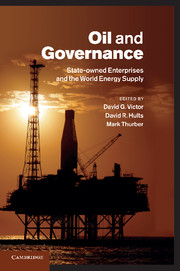Book contents
- Frontmatter
- Contents
- Figures
- Tables
- Boxes
- Contributors
- Acknowledgements
- Part I Introduction
- Part II Thematic studies of national oil companies
- 2 The political economy of expropriation and privatization in the oil sector
- 3 Hybrid governance: state management of national oil companies
- 4 On the state’s choice of oil company: risk management and the frontier of the petroleum industry
- Part III National oil company case studies
- Part IV Conclusions and implications
- Part V Appendices
- References
- Index
2 - The political economy of expropriation and privatization in the oil sector
Published online by Cambridge University Press: 05 January 2012
- Frontmatter
- Contents
- Figures
- Tables
- Boxes
- Contributors
- Acknowledgements
- Part I Introduction
- Part II Thematic studies of national oil companies
- 2 The political economy of expropriation and privatization in the oil sector
- 3 Hybrid governance: state management of national oil companies
- 4 On the state’s choice of oil company: risk management and the frontier of the petroleum industry
- Part III National oil company case studies
- Part IV Conclusions and implications
- Part V Appendices
- References
- Index
Summary
Introduction
With more than 70 percent of the world’s oil reserves, national oil companies (NOCs) dominate world oil markets (see Chapter 1). Fourteen of the top twenty oil companies in the world are NOCs or newly privatized NOCs. Moreover, NOCs appear to be increasing their control over global oil reserves (Kretzschmar et al. 2009). Due to their increasing pre-eminence in world energy markets, NOCs have recently been the focus of a cottage industry of academic studies. A number of studies have found profound differences between the performance of NOCs and independent, private oil companies. Eller et al. (2007), Victor (2007), and Wolf (2009) all find that NOCs are dramatically less efficient than their private counterparts. Moreover, Wolf and Pollitt (2008) find that NOC performance improves dramatically following privatization. However, NOC performance is far from monolithic. Some NOCs are able to perform as well as major private companies, while others fall significantly short (Victor 2007). Indeed, this entire volume explores how NOCs perform and how they differ from private enterprise.
These findings raise two interlocking puzzles about the structure of the global petroleum industry. First, if private oil companies usually perform so much better than nationalized companies, why have so many countries nationalized private oil companies’ assets and established state-owned petroleum companies? Second, why do so many countries continue to maintain nationalized oil companies in the face of strong evidence of weak performance?
- Type
- Chapter
- Information
- Oil and GovernanceState-Owned Enterprises and the World Energy Supply, pp. 35 - 61Publisher: Cambridge University PressPrint publication year: 2011
- 3
- Cited by



